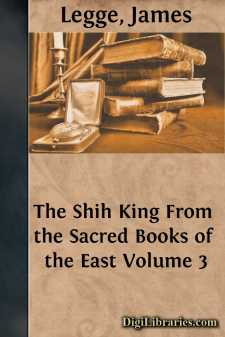Categories
- Antiques & Collectibles 13
- Architecture 36
- Art 48
- Bibles 22
- Biography & Autobiography 813
- Body, Mind & Spirit 142
- Business & Economics 28
- Children's Books 16
- Children's Fiction 13
- Computers 4
- Cooking 94
- Crafts & Hobbies 4
- Drama 346
- Education 46
- Family & Relationships 57
- Fiction 11829
- Games 19
- Gardening 17
- Health & Fitness 34
- History 1377
- House & Home 1
- Humor 147
- Juvenile Fiction 1873
- Juvenile Nonfiction 202
- Language Arts & Disciplines 88
- Law 16
- Literary Collections 686
- Literary Criticism 179
- Mathematics 13
- Medical 41
- Music 40
- Nature 179
- Non-Classifiable 1768
- Performing Arts 7
- Periodicals 1453
- Philosophy 64
- Photography 2
- Poetry 896
- Political Science 203
- Psychology 42
- Reference 154
- Religion 513
- Science 126
- Self-Help 84
- Social Science 81
- Sports & Recreation 34
- Study Aids 3
- Technology & Engineering 59
- Transportation 23
- Travel 463
- True Crime 29
The Shih King From the Sacred Books of the East Volume 3
by: James Legge
Description:
Excerpt
'The ancient duke Than-fû' was the grandfather of king Wan, and was canonized by the duke of Kâu as 'king Thâi.' As mentioned in a note on p. 316, he was the first of his family to settle in Kâu, removing there from Pin. the site of their earlier settlement, 'the country about the Khü and the Khî.'
In long trains ever increasing grow the gourds[2]. When (our) people first sprang, From the country about the Khü and the Khî[1], The ancient duke
[1. See the account of the battle of Mû in the third Book of the fifth Part of the Shû. Shang-fû was one of Wû's principal leaders and counsellors, his 'Grand-Master Shang-fû' in the next stanza.
2. As a gourd grows and extends, with a vast development of its tendrils and leaves, so had the House of Kâu increased.
3. These were two rivers in the territory of Pin, which name still remains in the small department of Pin Kâu, in Shen-hsî. The Khü flows into the Lo, and the Khî into the Wei.]
Than-fû Made for them kiln-like huts and caves, Ere they had yet any houses [1].
The ancient duke Than-fû Came in the morning, galloping his horses, Along the banks of the western rivers, To the foot of mount Khî[2]; And there he and the lady Kiang[3] Came and together looked out for a site.
The plain of Kâu looked beautiful and rich, With its violets, and sowthistles (sweet) as dumplings. There he began by consulting (with his followers); There he singed the tortoise-shell, (and divined). The responses were there to stay and then; And they proceeded there to build[4].
He encouraged the people, and settled them; Here on the left, there on the right. He divided the ground, and subdivided it; If he dug the ditches; he defined the acres. From the east to the west, There was nothing which he did not take in hand [5].
[1. According to this ode then, up to the time of Than-fû, the Kâu people had only had the dwellings here described; but this is not easily reconciled with other accounts, or even with other stanzas of this piece.
2. See a graphic account of the circumstances in which this migration took place, in the fifteenth chapter of the second Part of the first Book of Mencius, very much to the honour of the ancient duke.
3. This lady is known as Thâi-kiang, the worthy predecessor of Thâi-zan.
4. This stanza has reference to the choice--by council and divination--of a site for what should be the chief town of the new settlement.
5. This stanza describes the general arrangements for the occupancy and cultivation of the plain of Kâu, and the distribution of the people over it.]
He called his Superintendent of Works; He called his Minister of Instruction; And charged them with the rearing of the houses. With the line they made everything straight; They bound the frame-boards tight, so that they should rise regularly uprose the ancestral temple in its solemn grandeur[1].
Crowds brought the earth in baskets; They threw it with shouts into the frames; They beat it with responsive blows. They pared the walls repeatedly, till they sounded strong. Five thousand cubits of them arose together, So that the roll of the great drums did not overpower (the noise of the builders)[2].
They reared the outer gate (of the palace), Which rose in lofty state. They set up the gate of audience, Which rose severe and exact. They reared the great altar to the spirits of the land, From which all great movements should proceed[3]....


